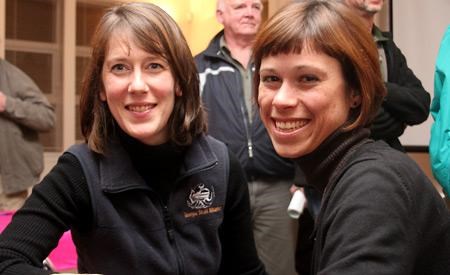A public meeting about liquid waste management attracted a standing-room only crowd and triggered a heated debate about a private business treating sewage. Approximately 120 people packed Trinity Hall at the United Church on February 22 for a meeting organized by Powell River Water Watch, a coalition of ratepayers’ associations, community groups and CUPE (Canadian Union of Public Employees) Local 798. Christianne Wilhelmson, managing director of Georgia Strait Alliance, Robin Roff, a researcher from the CUPE regional office who specializes in privatization and water issues, and Murray Dobbin, a Water Watch representative, all spoke at the event. Dobbin outlined the history of the city’s AIP (agreement in principle) with Catalyst Paper Corporation, which includes a provision to treat the city’s sewage at the Powell River division. He claimed the process has had a negative impact on democracy, that the city has pursued co-treatment “relentlessly,” has had little public consultation, hasn’t developed any serious competing option and has been reluctant to provide information on co-treatment to the public. The city has applied for $7.2 million from the UBCM (Union of BC Municipalities) Innovations Fund for co-treatment, Dobbin said, and the decision on the grant will be made before the city’s public consultation process unfolds. The application states that the start date of the co-treatment project is April. The application also states, “The LWMP [liquid waste management plan] included extensive consultation with members of the community and other stakeholders to ensure that the plan would meet environmental, social, and financial goals over the long-term future.” As well, it states, “The co-treatment option was selected in consultation with stakeholders.” Dobbin said neither of those statements is true. “It would be easy to argue that the city has applied for funding under false pretenses,” he said. There has never been a choice of options, Dobbin said, calling the other options “pretend options.” Councillor Dave Formosa, who attended the meeting as well as councillors Jim Palm, Chris McNaughton and Debbie Dee, asked Dobbin for a copy of his presentation. “From where I sit, it’s just not true,” Formosa said. “Are you calling me a liar, Mr. Formosa?” Dobbin asked. Formosa said no, but he would like to look at his presentation and have an opportunity to respond. “We agreed to look at co-treatment,” Formosa said. “We don’t have a signed deal on co-treatment.” He has also said in the past, Formosa said, that if co-treatment is going to cost the same amount of money as a stand-alone facility, “then I say we build our own system.” Dobbin asked Formosa how he could say he supported other options when the city has applied for funding for co-treatment. “You misled the UBCM by saying you’ve made the decision.” In her presentation, Roff outlined the risks inherent in co-treatment, including costs that would be incurred if the mill shut down, transaction and negotiation costs and operational costs. She said there were many reasons to oppose co-treatment, including the loss of accountability and transparency, increased costs, the lack of flexibility and responsiveness, as well as the “potential injustice of introducing the profit motif into something the UN [United Nations] has declared a basic human right.” Wilhelmson gave an overview of processes and new technologies, noting she has been involved in sewage treatment issues for over eight years. She said there needs to be a broader discussion of innovative options, such as closed-loop systems that tap into sewage as an energy resource or constructed wetlands. Waste planning is community planning, Wilhelmson said. “When you exclude communities in the discussion, it’s just a dangerous pattern, because this is your waste, this is your responsibility, but it is also your opportunity,” she said.



